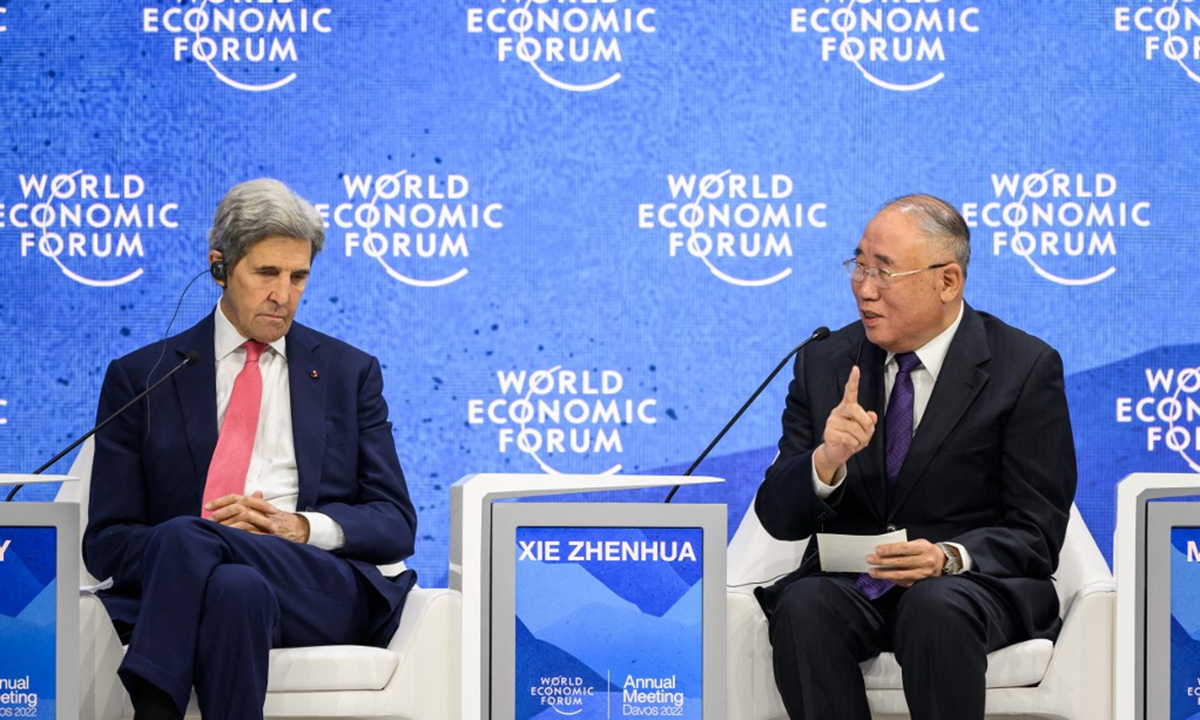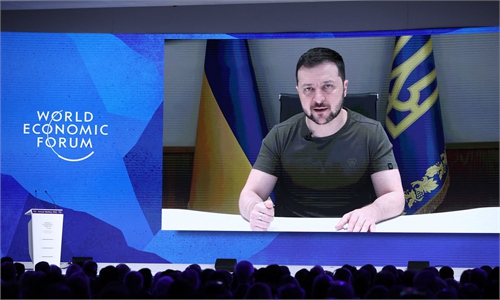China, US climate envoys meet in Davos amid tensions, signals room for cooperation
US' inconsistency in collaboration, tendency to politicize climate issue call for vigilance

China's special climate envoy Xie Zhenhua (right) meets with US climate envoy John Kerry (left) during a session at the World Economic Forum annual meeting in Davos. Photo: AFP
As the Chinese and US climate envoys met in a panel discussion in Davos on Tuesday, Chinese experts said it highlighted the room for cooperation on climate change amid bilateral tensions, while warning that the US' inconsistency in global climate cooperation and tendency to politicize the issue call for vigilance.
Xie Zhenhua, the Chinese delegation's special climate envoy to the Davos Forum, sat side by side with his US counterpart John Kerry in a panel discussion on Tuesday afternoon local time.
Xie is the only Chinese government representative participating in this year's World Economic Forum in Switzerland. His meeting with Kerry in the discussion titled "Safeguarding Our Planet and People" was the two envoys' first face-to-face meeting since November's climate talks in Glasgow.
Xie and Kerry held talks in the company of WEF President Borge Brende, according to the CGTN.
Asked by reporters about the mood, Brende said: "We always have high expectations when we have two of the most important people on the planet when it comes to climate change in our plenary. So we are very privileged."
"It isn't just about words anymore - it is about action. Action, now, is critical." These words by Xie were a call to arms to all people, and especially global leaders, to radically transform the way the global economy functions if "we're to avoid climate catastrophe," according to an article published on the website of the World Economic Forum.
Kerry and Xie have been working closely on finding climate solutions, with Kerry noting that "For at least the next 8 years, we must radically change our economic system and our reliance on fossil fuels if we're to stay aligned to Paris Agreement targets. This is the real battle of our time," said the article.
Xie stressed that China will take actions in three aspects: policy formulation, energy transformation and forest carbon sinks, which include promoting the green and low-carbon energy transformation, strengthening forest carbon sinks, and responding to the "Trillion Tree Campaign" launched by the WEF by striving to plant 70 billion trees in 10 years.
For China and the US, the climate sector is an area that deserves more cooperation, to which China has demonstrated a positive attitude, though the lack of continuity and credibility of the US is a cause for concern, Chinese experts said.
In April 2021, Xie and Kerry issued a joint declaration that was seen as a surprising positive signal. It was very important for the two officials to meet again in Davos following the declaration, Ma Jun, founder of the Institute of Public and Environmental Affairs, told the Global Times.
More serious climate issues under the shadow of COVID-19 pandemic, pollution from the increased use of fossil energy amid the Ukraine crisis, the rebound in global carbon emissions that occurred in 2021, and research and cooperation on zero-carbon technologies are all issues the two envoys are likely to explore, Ma said.
China and the US are the two countries with the highest carbon emissions, and also the most capable of conducting research and cooperation. On climate issues, the two share a fundamental consensus and common interests, so there is also some prospect for cooperation, even with the US always having a competitive mindset toward China, the environmental expert noted.
China's move to send Xie to participate in climate discussions at the Davos Forum reflects China's sincere attitude toward climate cooperation, Yuan Zheng, deputy director and senior fellow of the Institute of American Studies, the Chinese Academy of Social Sciences, told the Global Times.
"For issues involving global interests, China votes for cooperation, and will not give up its efforts to cooperate just because of the change in China-US relations, but will take up its responsibility as a great power," he said.
However, the US' erratic approach to international cooperation on climate issues and the difficulty of advancing domestic legislation are worrisome. Damaged international credibility of the US could be a concern for countries working with it, experts noted.
"During the Trump era, the US pulled out of the Paris Agreement and even hamstrung other countries from cooperating afterwards," Ma said. "This led to a period of time in which the global capacity to address climate change suffered a huge setback."
In contrast to some European countries, the US has again failed to get bills addressing climate change into the legislative process. Given its domestic political situation, maintaining a consistent strategy or finding a smooth path to legislation is hardly guaranteed, experts said.
"Too often, the US expresses a high profile internationally about addressing a problem, but rarely advances it domestically. Such a recurring situation weakens the international credibility of the US," Wu Xinbo, dean of the Institute of International Studies at Fudan University, told the Global Times. "The international community will also remain concerned and worried."
In the recent Quad talks, the US also brought in the climate issues. A "Quad Climate Change Adaptation and Mitigation Package (Q-CHAMP)" was launched on Tuesday as issued in the joint statement of the four member states, which includes ongoing activities under the Quad Climate Working Group on green shipping and ports, as well as clean energy cooperation, among other topics.
According to the joint statement, Quad members will accelerate their efforts to raise global ambitions, including reaching out to key stakeholders in the Indo-Pacific region and supporting, strengthening and enhancing climate actions by partners in the region.
However, Wu warned that "the US is lacing the climate discussion with geopolitical elements."
The US recently created trouble on the foundation of China-US relations, which will more or less affect the atmosphere of cooperation between the two countries, Yuan said.
In the 2021 US-EU summit, the US-EU Trade and Technology Council was set up. The US talked a lot about limiting China's advantages in solar energy while promoting global climate cooperation.
"The two-faced nature of the US on climate cooperation requires vigilance," said Lü Xiang, a research fellow at the Chinese Academy of Social Sciences.
China-US cooperation on climate change cannot be divorced from the overall situation of China-US relations. The US should work with China to meet each other halfway and take positive actions to bring China-US relations back on track, Chinese State Councilor and Foreign Minister Wang Yi said when meeting with Kerry who is in Tianjin for the China-US negotiations on climate change via video link at the latter's request.
On Monday, Xie met with the chief of the International Energy Agency Fatih Birol to discuss the global energy transition and China's green push, which Birol said was an "excellent discussion."
During the meeting, Xie discussed China's efforts and policy moves to respond to global climate change and promote renewable energy, according to a person in the Chinese delegation. The parties agreed that the IEA and China should enhance communication and cooperation to jointly promote efforts to address climate change, Caixin Magazine reported.



